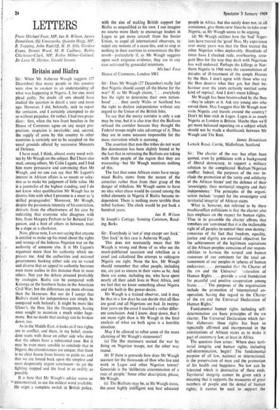Sir : The charter of the OAU has often been
quoted, even by politicians with a background of liberal democracy, to support a military solution to the complicated Biafran /Nigerian conflict. Indeed, the purposes of the OAU in- clude the promotion of the 'unity and solidarity of -the African Stateif and the defence of their 'sovereignty, their territorial integrity and their independence.' The principles of the organi- sation include 'respect for the sovereignty and territorial integrity' of African states.
What is, however, not referred to by these machiavellian politicians is that the charter also lays emphasis on the respect for human rights. Thus in its preamble the charter affirms that members are 'convinced that it is the inalienable right of all peoples to control their own destiny; conscious of the fact that freedom, equality, justice and dignity are essential objectives for the achievement of the legitimate aspirations of the African peoples; conscious of our respon- sibilities to harness the natural and human resources of our continent for the total ad- vancement of our peoples in spheres of human endeavour; . . . persuaded that the Charter of the UN and the Universal seclaration of Human Rights . . . provide a solid foundation for peaceful and positive cooperation among States . . The purposes of the organisation include the promotion of 'international co- operation, having due regard to the Charter of the UN and the Universal Declaration of Human Rights.'
Fundamental human rights including self- determination are basic principles of the UN charter. The Universal Declaration which fur- ther elaborates these rights has been so repeatedly affirmed and incorporated in the constitutions of African states as to make it part of customary law, at least in Africa.
the question then arises : Where does terri- torial integrity and human rights, including self-determination, begin? The fundamental purpose of all law, national or international, is the preservation of man and the promotion of his health and happiness. No law can be tolerated which is destructive of these ends. Territorial integrity cannot be given Rich a meaning that it supports the massacres of great numbers of people and the denial of human rights; it cannot be used to support the
domination of one people by another. There is nothing in the charter that permits the pogroms of 30,000 Eastern Nigerians in Northern Nigeria, 10,000 Ibos in the Midwest state of Nigeria, 1000 Ibos in the Nsukka area and 3,000 Biafrans in the Calabar area last year. The charter does not authorise the breach of the laws of warfare, the bombardment of civilian populations and the starvation to death of thousands of refugees a day. In the view of the Swedish government the 'international' observers neither proved nor disproved the Biafran allegation of genocide; they certainly did not give Federal troops a certificate of honours as some would have us believe.
A proper interpretation of the human rights provisions of the ow charter shows that they have been flagrantly breached by the Nigerians in their actions towards the Biafrans. The remedy lies, not in a quick kill advocated by some of these politicians and the militarists, but, in the words of the charter, in 'peaceful settlement of disputes by negotiation, media- tion, conciliation or arbitration.' Thus can we help to safeguard the human rights guaranteed by the charter of the ow.



































 Previous page
Previous page